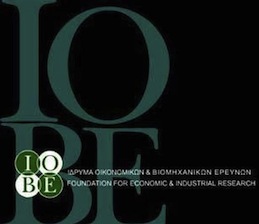Photo: attacktv.gr
Victoria Mindova
The long and tough negotiations with the lenders from the International Monetary Fund and Europe killed the economic activity in Greece in 2012 as stated by the chief economic analyst at the Institute for Economic and Industrial Research (IOBE) Angelos Tsakanikas during the presentation of the quarterly report on the development of the business activity of the Mediterranean country.
 According to the economists, the past year was extremely difficult mainly because of the danger of the country leaving the eurozone. By addressing this challenge, the government has gained greater stability, which is a step in the right direction. However, the 2012 recession remains high - 6.6% and the prospects for 2013 are that it will not exceed 4.5% if no unforeseen political turmoil and social unrest change the situation in the country.
According to the economists, the past year was extremely difficult mainly because of the danger of the country leaving the eurozone. By addressing this challenge, the government has gained greater stability, which is a step in the right direction. However, the 2012 recession remains high - 6.6% and the prospects for 2013 are that it will not exceed 4.5% if no unforeseen political turmoil and social unrest change the situation in the country.
The first half of this year will be harder for the economic activity in the country and economic growth is expected to come as early as 2014. Social cooperation is crucial to the stabilisation of the economy. Privatisations are part of the strategic pillar of recovery and structural reforms and liberalisation of the internal market must continue along with them.
"The results of the contraction of GDP are not unexpected", emphasize economic analysts. The negative economic results were inevitable if we consider the two election periods in 2012, the risk of GREXIT and the protracted negotiations with the country's lenders for the payment of the tranche of 50 billion euro.
High unemployment remains one of the greatest problems in Greece and it is expected to exceed 27% in 2013. Although the privatisation programme is expected to enter its active stage this year, economists predict that unemployment will continue to rise. Analysts stress that restoration of jobs will be much more difficult than their loss and believe that economic growth will not compensate for the loss of jobs. A broader strategy to combat unemployment must be developed on the basis of the sectors that produce competing products sellable on the international market. The situation becomes further complicated due the decline in the economic power of the eurozone, which is the major customer of Greek production.
The head of the Institute and CEO of S & B "Industrial Minerals," Odysseas Kiriakopoulos states that there is a huge gap between the educational system and the needs of the real economy. This difference catalyzes a further increase in unemployment and it will create serious problems for the recovery of jobs in the future. The practice, familiar from the past, of creating jobs with cheap international lending that comes from the public sector can no longer be used.
Private enterprise is the basis for the creation of opportunities for professional development and career and there are four main prerequisites to make this possible. The first one is to attract foreign investment in the country. The second is investment from local businesses whereas the other two are related to the success of privatisation and development of public-private initiatives that will drive larger projects.
According to IOBE, the proper use of public property by private entrepreneurs can bring in the country an additional investment to the amount of 60 billion euro in the long run, which will increase GDP by 1% annually, will help to open 50 thousand new jobs and will increase tax revenues by 3% of GDP.
Positive developments in 2013 are considered the return of some of the amounts due by the public sector to the business, the completion of bank recapitalisation and the reduced interest rates on loans to local banks, which it will bring. After the recapitalisation of the domestic financial system, the European Bank will reduce the interest rates for Greek banks from 2.75% to 0.75%. This is expected to allow the real economy to take a breath by increasing the financing to the businesses in the country and if the stabilisation continues, a boom in the return of capital in the country is also expected.